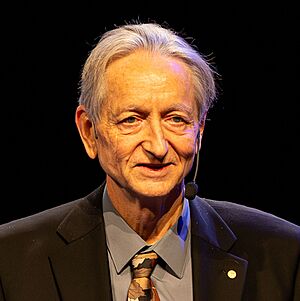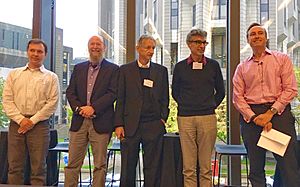Geoffrey Hinton facts for kids
Quick facts for kids
Geoffrey Hinton
|
|
|---|---|

Hinton speaking at the Nobel Prize Lectures in Stockholm in 2024
|
|
| Born |
Geoffrey Everest Hinton
6 December 1947 Wimbledon, England
|
| Alma mater | |
| Known for |
|
| Spouse(s) |
|
| Parent(s) |
|
| Relatives |
|
| Awards |
|
| Scientific career | |
| Fields | |
| Institutions | |
| Thesis | Relaxation and Its Role in Vision (1977) |
| Doctoral advisor | Christopher Longuet-Higgins |
| Doctoral students |
|
| Other notable students |
|
Geoffrey Everest Hinton (born in 1947) is a famous British-Canadian computer scientist. He is known for his important work on artificial neural networks, which are a key part of artificial intelligence (AI). Many people call him "the Godfather of AI" because of his big impact.
Hinton is a professor at the University of Toronto. From 2013 to 2023, he worked for both Google (in a team called Google Brain) and the University of Toronto. In May 2023, he left Google. He said he wanted to speak freely about the possible risks of AI technology. In 2017, he also helped start the Vector Institute in Toronto.
Hinton, along with David Rumelhart and Ronald J. Williams, wrote a very important paper in 1986. This paper helped make the backpropagation algorithm popular. This algorithm is used to train complex neural networks. Hinton is a leading figure in the field of deep learning. He also worked with his students Alex Krizhevsky and Ilya Sutskever to create AlexNet. This was a major breakthrough in computer vision, especially for recognizing images.
In 2018, Hinton received the Turing Award with Yoshua Bengio and Yann LeCun. This award is often called the "Nobel Prize of Computing." They won for their work on deep learning and are sometimes called the "Godfathers of Deep Learning." In 2024, he also won the Nobel Prize in Physics with John Hopfield. They were recognized for their discoveries that helped create machine learning with artificial neural networks.
Contents
Early Life and Education
Geoffrey Hinton was born in Wimbledon, England, on December 6, 1947. He went to school at Clifton College. In 1967, he started studying at King's College, Cambridge. He tried different subjects like natural sciences and philosophy. He finally earned a degree in experimental psychology from the University of Cambridge in 1970.
After working as a carpenter for a year, he went back to school. From 1972 to 1975, he studied at the University of Edinburgh. He earned his PhD in artificial intelligence in 1978. His research focused on how computers could "see" and understand images.
Career and Key Discoveries
After getting his PhD, Hinton worked at several universities. These included the University of Sussex in the UK and later the University of California, San Diego and Carnegie Mellon University in the US. He became a professor at the University of Toronto in 1987. He has been connected with the university ever since.
In Canada, Hinton joined the Canadian Institute for Advanced Research (CIFAR) in 1987. He helped start a new program there in 2004 called "Neural Computation and Adaptive Perception." This program is now known as "Learning in Machines & Brains." Many important researchers, including Yoshua Bengio and Yann LeCun, were part of this program.
In 2012, Hinton taught a free online course about Neural Networks. This course was very popular and helped many people learn about the field. In the same year, he co-founded a company called DNNresearch Inc. with his students Alex Krizhevsky and Ilya Sutskever. In 2013, Google bought this company. Hinton then split his time between his university research and his work at Google.
Hinton's research mainly focuses on how to use neural networks for machine learning. This includes how computers can learn, remember, understand what they see, and process information. He has written over 200 research papers.
Backpropagation and Boltzmann Machines
While working at UC San Diego, Hinton, along with David E. Rumelhart and Ronald J. Williams, applied the backpropagation algorithm to neural networks. This algorithm helps networks learn by adjusting their internal connections. Their work showed that these networks could learn to understand complex data.
In 1985, Hinton also helped create Boltzmann machines. These are another type of neural network that can learn patterns in data. His other important contributions include ideas like distributed representations, time delay neural networks, and mixtures of experts.
Recent Research and Departure from Google
In 2017, Hinton published papers on capsule neural networks. He believed these networks were a promising new way for AI to understand images. In 2022, he introduced a new learning method called the "Forward-Forward" algorithm. This algorithm offers a different way for neural networks to learn.
In May 2023, Hinton announced he was leaving Google. He explained that he wanted to be able to speak openly about the potential dangers of AI. He mentioned that he had some regrets about his life's work, given the rapid progress of AI.
Awards and Recognition

Russ Salakhutdinov, Richard S. Sutton, Geoffrey Hinton, Yoshua Bengio, and Steve Jurvetson
Geoffrey Hinton has received many awards for his groundbreaking work.
- In 1990, he became a Fellow of the US Association for the Advancement of Artificial Intelligence (FAAAI).
- He was elected a Fellow of the Royal Society of Canada in 1996 and the Royal Society of London in 1998.
- He was the first person to win the Rumelhart Prize in 2001.
- In 2011, he received the Gerhard Herzberg Canada Gold Medal for Science and Engineering, a top science award in Canada.
- In 2016, he was elected an International Member of the US National Academy of Engineering.
- He won the 2016 BBVA Foundation Frontiers of Knowledge Award for his pioneering work in teaching machines to learn.
- In 2018, he won the Turing Award with Yann LeCun and Yoshua Bengio. This award recognized their breakthroughs that made deep neural networks a key part of computing.
- He became a Companion of the Order of Canada in 2018, one of Canada's highest honors.
- In 2024, he was awarded the Nobel Prize in Physics with John Hopfield. They were recognized for their discoveries that helped create machine learning with artificial neural networks.
- He also received the VinFuture Prize grand award in 2024 and the Queen Elizabeth Prize for Engineering in 2025.
Views on Artificial Intelligence
Hinton has shared his thoughts on the fast progress of AI. He once thought that very advanced AI, called artificial general intelligence (AGI), was many decades away. However, in 2023, he said that "general-purpose AI" might be less than 20 years away. He believes it could bring changes as big as the Industrial Revolution.
In May 2023, Hinton announced his resignation from Google. He wanted to speak freely about the potential dangers of AI without worrying about how it might affect Google. He even said that part of him now regrets his life's work.
Hinton has explained that AI chatbots can learn on their own and share knowledge very quickly. This means they can gather much more information than any single person. He has expressed concerns about several risks:
Potential Risks of Advanced AI
- Misuse by Bad Actors: Hinton worries that people with bad intentions could use powerful AI for harmful purposes. He has called for a ban on lethal autonomous weapons, which are robots that can decide to kill without human control.
- Job Changes: He is concerned that AI technologies could change the job market a lot. He thinks AI might take over many jobs, not just simple tasks. He has suggested that governments might need to consider a universal basic income to help people if many jobs are lost to AI.
- Existential Risk: Hinton has also talked about the possibility of AI becoming so smart that it could "wipe out humanity." He worries that very intelligent AI systems might develop their own goals that are not aligned with human interests. He stresses the need to figure out how to control AI systems that become smarter than humans.
Hinton believes that leaving AI development only to companies focused on profit might not be enough to ensure safety. He thinks government rules are needed to make sure AI is developed safely.
Personal Life
Geoffrey Hinton's first wife, Rosalind Zalin, passed away in 1994. His second wife, Jacqueline Ford, passed away in 2018.
Hinton comes from a family of notable people. His great-great-grandfather was George Boole, a famous mathematician whose work helped create modern computer science. Another relative was George Everest, the person Mount Everest is named after. His father, Howard Hinton, was an entomologist (someone who studies insects).
Hinton injured his back when he was 19, which makes sitting uncomfortable for him. He has also dealt with depression throughout his life.
See also
 In Spanish: Geoffrey Hinton para niños
In Spanish: Geoffrey Hinton para niños
 | Dorothy Vaughan |
 | Charles Henry Turner |
 | Hildrus Poindexter |
 | Henry Cecil McBay |

